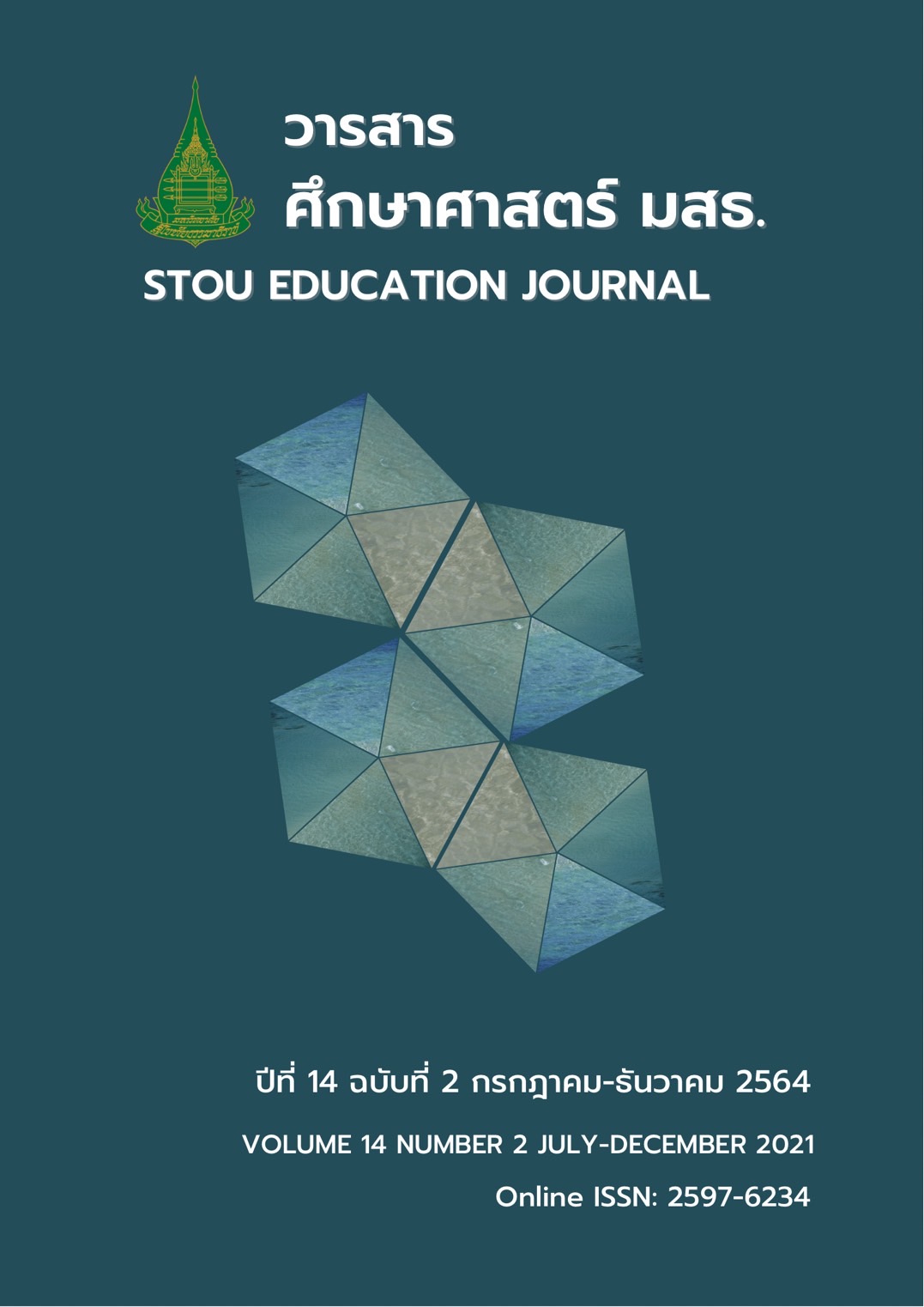การพัฒนาบทเรียนสำเร็จรูปอิเล็กทรอนิกส์เพื่อพัฒนาผลสัมฤทธิ์ทางการเรียนภาษาไทยของนักเรียนที่มีความบกพร่องทางการเห็น
Main Article Content
บทคัดย่อ
การวิจัยนี้มีวัตถุประสงค์เพื่อ 1) ศึกษาข้อมูลพื้นฐานและความต้องการบทเรียนสำเร็จรูปอิเล็กทรอนิกส์เพื่อช่วยพัฒนาผลสัมฤทธิ์ทางการเรียนภาษาไทยของนักเรียนที่มีความบกพร่องทางการมองเห็น 2) พัฒนาบทเรียนสำเร็จรูปอิเล็กทรอนิกส์เพื่อพัฒนาผลสัมฤทธิ์ทางการเรียนภาษาไทยของนักเรียนที่มีความบกพร่องทางการมองเห็น 3) เปรียบ เทียบผลสัมฤทธิ์ทางการเรียนภาษาไทยของนักเรียนก่อนและหลังเรียนด้วยบทเรียนสำเร็จรูปอิเล็กทรอนิกส์ที่พัฒนาขึ้น และ 4) ศึกษาความคงทนในการเรียนรู้ของนักเรียนที่มีความบกพร่องทางการมองเห็น กลุ่มตัวอย่าง คือ นักเรียนที่มีความบกพร่องทางการเห็น ระดับชั้นประถมศึกษาปีที่ 6 โรงเรียนสอนคนตาบอดกรุงเทพ จำนวน 20 คน ภาคการศึกษาต้น ปีการศึกษา 2561 ได้มาจากการสุ่มอย่างง่าย เครื่องมือที่ใช้ ประกอบด้วย 1) แบบสอบถาม 2) แบบสัมภาษณ์ 3) บทเรียนสำเร็จรูปอิเล็กทรอนิกส์รายวิชาภาษาไทย ระดับชั้นประถมศึกษาปีที่ 6 และ 4) แบบทดสอบผลสัมฤทธิ์ทางการเรียนภาษาไทย วิเคราะห์ข้อมูลโดยใช้ค่าร้อยละ ค่าเฉลี่ย ส่วนเบี่ยงเบนมาตรฐาน การทดสอบค่าที และการวิเคราะห์เนื้อหา ผลการวิจัย พบว่า 1) ผลการศึกษาข้อมูลพื้นฐานและความต้องการ ปรากฎว่า บทเรียนสำเร็จรูปอิเล็กทรอนิกส์มีความสำคัญและจำเป็น เพราะช่วยให้นักเรียนสามารถเรียนรู้ได้ตามศักยภาพของแต่ละบุคคล ลักษณะบทเรียนสำเร็จรูปอิเล็กทรอนิกส์ที่นักเรียนและครูต้องการมากที่สุด คือ การบรรยายเนื้อหาเป็นเสียงพูดหรือเสียงสังเคราะห์ และเป็นบทเรียนแบบรายบุคคล 2) ประสิทธิภาพของบทเรียนสำเร็จรูปอิเล็กทรอนิกส์ มีค่าเท่ากับ 77.00 / 80.67 ซึ่งสูงกว่าเกณฑ์ 75/75 ที่กำหนดไว้ 3) ผลสัมฤทธิ์ทางการเรียนภาษาไทยของนักเรียนหลังเรียนสูงกว่าก่อนเรียนอย่างมีนัยสำคัญทางสถิติที่ระดับ .01 และ 4) นักเรียนมีความคงทนในการเรียนรู้ภาษาไทยหลังการใช้บทเรียนสำเร็จรูปอิเล็กทรอนิกส์ไปแล้ว 14 วัน สูงกว่าเกณฑ์ร้อยละ 70 อย่างมีนัยสำคัญทางสถิติที่ระดับ .01
Article Details
เอกสารอ้างอิง
กมลา สุริยพงศ์ประไพ. (2546). การพัฒนาบทเรียนสำเร็จรูป เรื่อง ปาเลสไตน์ มาตุภูมิของพระเยซูเจ้า สำหรับนักเรียนมัธยมศึกษาปีที่ 2. (วิทยานิพนธ์ปริญญาศึกษาศาสตรมหาบัณฑิต ไม่ได้ตีพิมพ์) มหาวิทยาลัยศิลปากร,กรุงเทพฯ.
ชัยญา วงศ์สกุล. (2542) การเปรียบเทียบผลสัมฤทธิ์ทางการเรียนวิชา ส 503 สังคมศึกษา เรื่องภูมิศาสตร์กายภาพของประเทศไทย ของนักเรียนชั้นมัธยมศึกษาปีที่ 5 ที่ได้รับการสอนโดยบทเรียนสำเร็จรูปและตามแนวคู่มือครู . (วิทยานิพนธ์ปริญญาศึกษาศาสตรมหาบัณฑิต ไม่ได้ตีพิมพ์) มหาวิทยาลัยศิลปากร,กรุงเทพฯ.
ชัยยงค์ พรหมวงศ์. (2556). การทดสอบประสิทธิภาพสื่อหรือชุดการสอน. วารสารศิลปากรศึกษาศาสตร์, 5(3), 7-20.
ถวัลย์ มาศจรัส. (2548). บทเรียนโปรแกรมกลุ่มสาระการเรียนรู้ภาษาไทย. กรุงเทพมหานคร: ธารอักษร.
ทิศนา แขมมณี. (2547).ศาสตร์การสอน (พิมพ์ครั้งที่ 3) แก้ไขเพิ่มเติม. กรุงเทพมหานคร: สำนักพิมพ์แห่งจุฬาลงกรณ์มหาวิทยาลัย.
ธีระชัย ปูรณโชติ. (2539). การสร้างบทเรียนสำเร็จรูป เส้นทางสู่อาจารย์ 3 (พิมพ์ครั้งที่ 3). กรุงเทพมหานคร: โรงพิมพ์จุฬาลงกรณ์มหาวิทยาลัย.
วันทนีย์ พันธชาติ. (2552). การพัฒนาศักยภาพเด็กที่มีปัญหาการเรียนรู้โดยเทคโนโลยีสิ่งอํานวยความสะดวก. สารเนคเทค,16(84), 4-5.
สานิตย์ กายาผาด. (2547). เทคโนโลยีสารสนเทศเพื่อชีวิต. กรุงเทพมหานคร : เธิร์ดเวฟ เอ็ดดูเคชัน.
สุรสิทธิ์ วรรณไกรโรจน์. (2557). ความหมายของการเรียนรู้ผ่านออนไลน์(e-learning). สืบค้นจากhttp://www.thai2learn.com.
สุนันทา สุนทรประเสริฐ. (2544). การผลิตนวัตกรรมการเรียนการสอนเล่ม 2 การสร้างแบบฝึก. ม.ป.ท.
สุรางค์ โค้วตระกูล. (2550). จิตวิทยาการศึกษา (พิมพ์ครั้งที่ 7). กรุงเทพมหานคร: จุฬาลงกรณ์มหาวิทยาลัย.
สุวิทย์ มูลคำ และ อรทัย มลูคำ. (2544). เรียนรู้สู่ครูมืออาชีพ (พิมพ์ครั้งที่ 6). กรุงเทพมหานคร:ดวงกมลสมัย.
Driver, R., & Bell, B. (1986). Students' thinking and the learning of science: A constructivist view. School Science Review, 67, 443-456.


